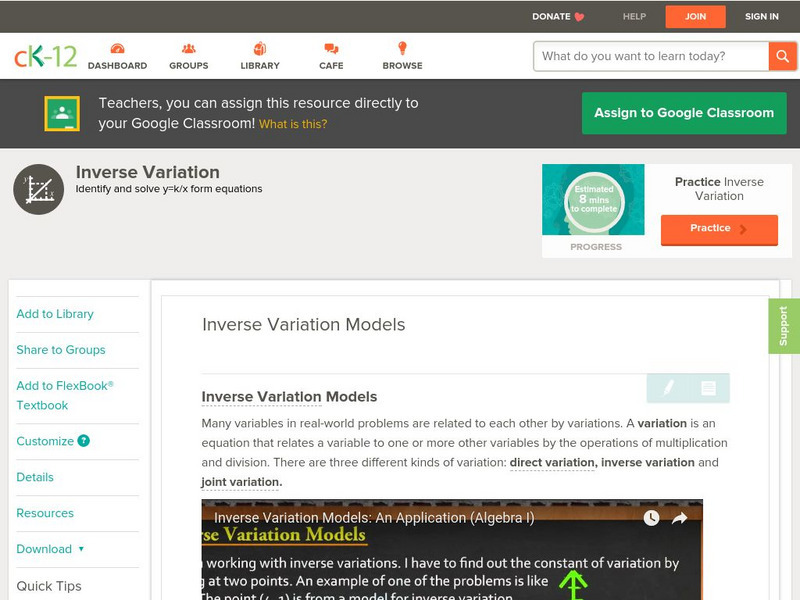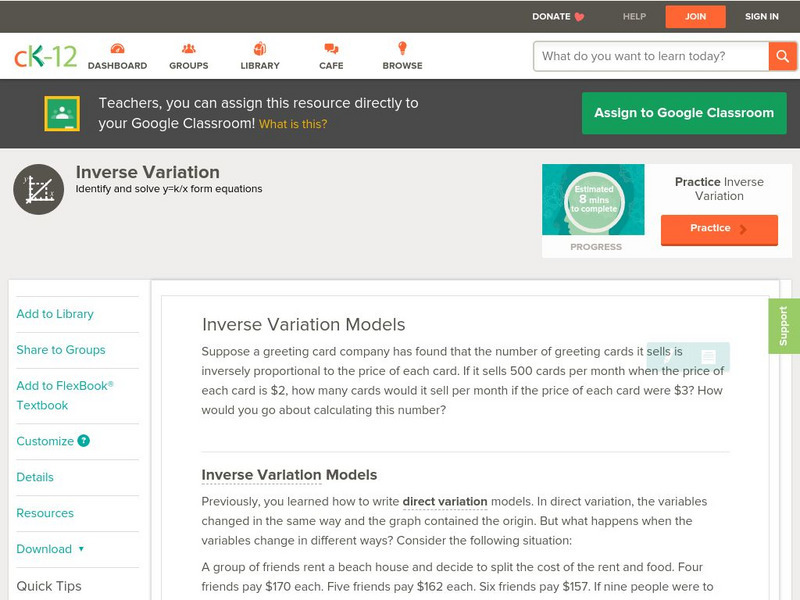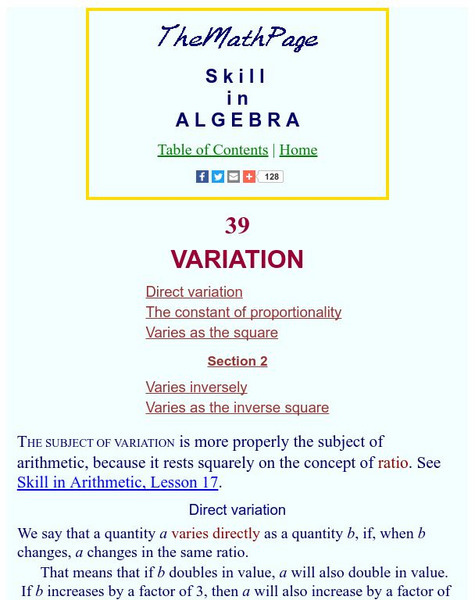EngageNY
Unit Rate as the Constant of Proportionality
What do unit rates and constants of proportionality have in common? The lesson plan addresses this question and introduces the concept of constant proportionality to the class. Individuals find that the unit rate and the constant of...
EngageNY
Proportional Relationships
Challenge the class to determine whether two quantities are proportional. The second lesson in a unit of 22 has class members decide if two quantities have a proportional relationship. If a proportional relationship exists, the pupils...
EngageNY
An Exercise in Changing Scales
Classmates create a scale drawing from another scale drawing, changing the scale in the process. Groups enlarge or reduce the scale of the drawing and discuss their processes.
EngageNY
Computing Actual Lengths from a Scale Drawing
Class members take scale drawings and examine scales to determine distances in the actual objects. Pupils convert the scales of different units to scale factors that can be used in proportional equations.
EngageNY
Equations of Graphs of Proportional Relationships Involving Fractions
The 15th segment in a series of 22 uses examples that present proportional relationships with fractions. Pupils work through the problems and discover that the process is the same as it is with whole number values. Graphing the...
EngageNY
Ratios of Fractions and Their Unit Rates 2
Remodeling projects require more than just a good design — they involve complex fractions, too. To determine whether a tiling project will fit within a given budget pupils calculate the square footage to determine the number of...
EngageNY
Representing Proportional Relationships with Equations 2
Scholars determine how long it takes to build a birdhouse with the second activity on using equations with proportional relationships. The resource uses examples such as birdhouse building and produce prices to encourage pupils to write...
EngageNY
Identifying Proportional and Non-Proportional Relationships in Graphs 2
Work together to find proportional relationships. The sixth portion of the 22-part unit is a collaborative exercise. Teams work with given representations of relationships and determine if they are proportional by creating tables and...
EngageNY
Identifying Proportional and Non-Proportional Relationships in Tables 2
Not all relationships with a pattern are proportional. Show your class why in the fourth installment of a 22-part series. The lesson builds upon previous parts and has pupils analyze tables to determine whether they represent a...
EngageNY
Constant Rate
Two-variable equations can express a constant rate situation. The lesson presents several constant rate problems. Pupils use the stated constant rate to create a linear equation, find values in a table, and graph the points. The resource...
EngageNY
Linear Functions and Proportionality
Connect linear equations, proportionality, and constant rates of change to linear functions. Young mathematicians learn how linear equations of the form y = mx + b can represent linear functions. They then explore examples of linear...
Teach Engineering
Spring Away!
The last segment of the nine-part unit makes a connection between springs and linear equations. Groups hang weights from the spring and measure its length. Then, using the data collected, they calculate the slope to find the k-value...
Mathematics Assessment Project
Shelves
Don't leave this task on the shelf — use it is assess middle schoolers understanding of patterns. Participants try to discover a pattern in the number of bricks and planks used to make shelves. They then match descriptions...
Utah Education Network (UEN)
Analyze Proportional Relationships and Use Them to Solve Real-World Problems
What proportion of learners will benefit from the lessons on proportional reasoning? Class members learn about proportional relationships, from unit rates to writing equations for proportional relationships. Then, they learn to use...
Willow Tree
Ratios and Proportions with Congruent and Similar Polygons
Investigate how similar and congruent figures compare. Learners understand congruent figures have congruent sides and angles, but similar figures only have congruent angles — their sides are proportional. After learning the...
CK-12 Foundation
Ck 12: Algebra: Inverse Variation Models
[Free Registration/Login may be required to access all resource tools.] Graph, write, and solve inverse variations.
CK-12 Foundation
Ck 12: Algebra: Inverse Variation Models
[Free Registration/Login may be required to access all resource tools.] Learn how to solve problems involving inverse variation.
Lawrence Hall of Science
The Math Page: Skill in Algebra: Variation
Here is a site that clearly and thoroughly explains direct and inverse variation. There are example problems solved, problems for the student to attempt, and answers to the student problems. Point this site out to students who have been...
CK-12 Foundation
Ck 12: Algebra: Graphs of Linear Models of Direct Variation
[Free Registration/Login may be required to access all resource tools.] Students will write, graph, and solve direct variation models for real-world problems. Students examine guided notes, review guided practice, study vocabulary, watch...
Common Core Sheets
Common Core Sheets: Ratios and Proportional Relationships 7.rp.2b Worksheets
Print or create worksheets or flashcards to assess students' understanding of the constant of proportionality.



















